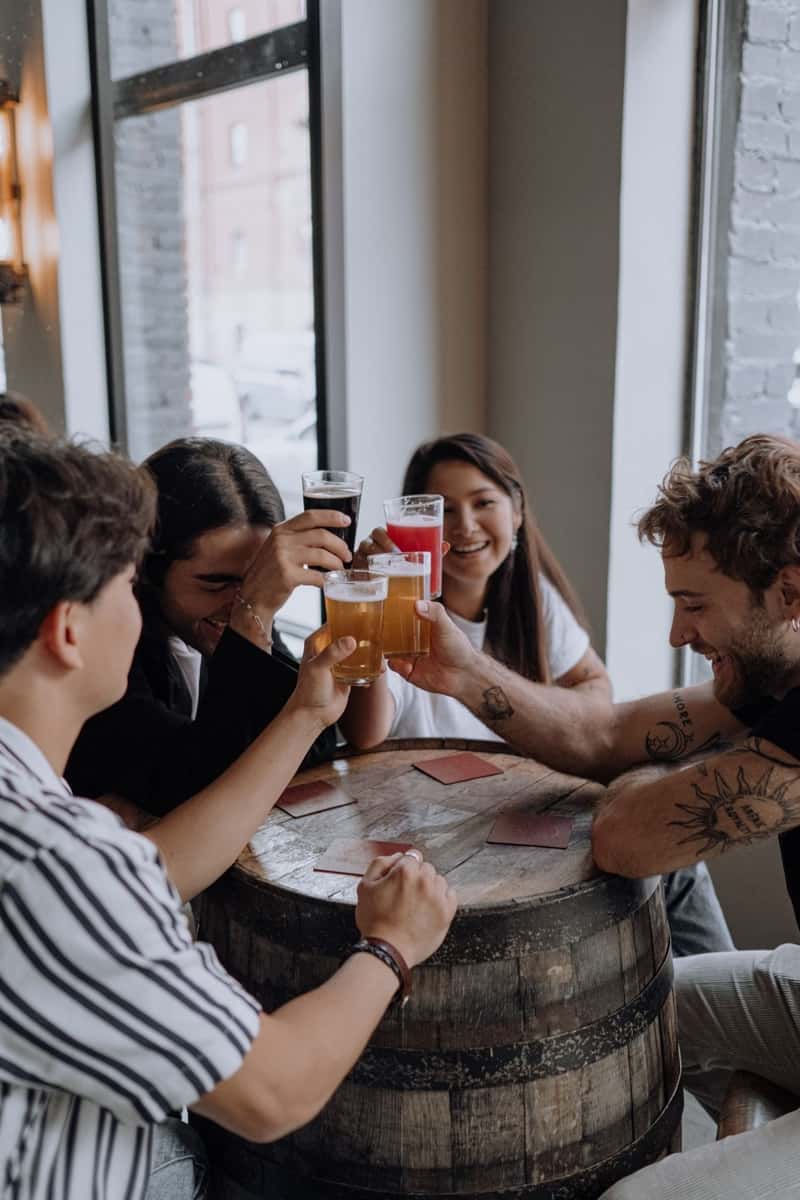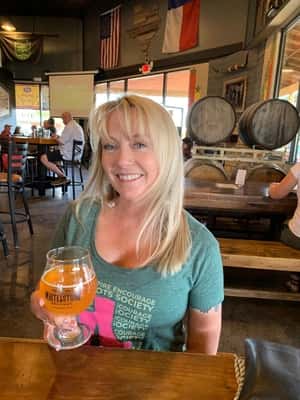
Updated: 5/20/2022
Hosting events at your brewery or craft beer bar is a great way to attract new customers and strengthen your brand. Breweries and craft beer bars have become increasingly popular choices for social gatherings among friends and family. And hosting and promoting events will help your business stand out in a crowded marketplace.
It can be as simple as including “plug-and-play” events in your monthly schedule, or as complex as customizing an event around a theme.Keeping events in line with your marketing strategy will help you decide the right mix that will appeal to your specific market and ultimately help you attract and retain new customers.
What We’ll Cover in This Piece:
What Makes a Successful Event?

Photography courtesy of Elevate from Unsplash
Regardless of the type of events you decide to host, being creative with event planning and then promoting your ideas will help attract new customers to your business.
“In my opinion and experience, overall, an event that draws attendees from wide swathes of backgrounds is more engaging and can bring more to everyone’s experience,” says Ann Reilly, Executive Director of the NYC Brewers Guild.
“For promotional events—like those typically held at a bar or restaurant where one brewery, in particular, is featured—mixing up the expected is one path to a great event. Meaning, instead of simply offering brewery swag as prizes for a bar’s trivia night or offering tastes of the different styles of beer for people to try, think a little bit outside the box on planning.Is it a local brewery that uses local ingredients? Maybe an educational aspect, or local food pairing with the opportunity to speak with the growers/makers.”
This is the fun part of planning! Get those creative juices flowing. Thinking outside the box when planning events, whether they happen every week, every month, or once a year, will lead to a higher success rate.
The Ease of Recurring Events

Photography courtesy of Hop Culture
Adding recurring “plug-and-play” type events to your schedule is the easiest way to get started with an event strategy. These events simply require engaging a provider and allowing them to run the event in your space. Common examples include trivia nights, bingo, live music, comedy sets, and a variety of live workout classes.
“In addition to being able to regularly engage with a known consumer base, recurring events can bring more brand recognition,” says Reilly. “If it’s commonly known that an event will take place at the same time each year (for example, NYC Beer Week), that gives participants, hosts, and attendeesplenty of time to plan. That consistency can assist in the growth of the reach, audience, and experience.”
A word of caution with this type of event: Avoid overcrowding your schedule. Sometimes patrons simply want to enjoy your venue without the distraction of an activity. With recurring events, it’s all about finding the right balance.
To efficiently manage and organize these recurring events, it’s highly recommended to implement an event management system like Perfect Venue. Such a system can help you streamline the scheduling process, keep track of event details, and plan well in advance. This technology can also assist in managing reservations, collecting deposits, sending reminders to attendees, and gathering feedback to continually improve the event experience. By utilizing an event management system, you’ll ensure that your recurring events run smoothly and enhance your overall event strategy.
The Benefits of a Custom Event
Creating unique events takes more time and resources, but the rewards include expanding your customer reach and creating brand loyalty. For example, new customers tend to return after an event takes place.
Common custom events include beer release celebrations, anniversary parties, holiday parties, and special theme parties like beer-pairing events.
“One type of event I’d done several years ago that lends itself to different seasons and audiences was things like pairing Halloween candy with beers, as well as at another time of year Girl Scout Cookies paired with particular styles. Additionally, for Valentine’s Day, we’d paired different stouts and dark beers with varieties of chocolates to complement each other,” says Reilly.
Similarly, at Austin-based Austin Beerworks, Co-Founder Michael Graham likes to create events that coincide with a popular seasonal beer release and always include commemorative merchandise.
“We always like to tie in special items that are relevant to the party. For example, we’ve made both bathrobes and ushanka hats for our Sputnik release parties. Those are really different items, but they’re both related to the theme and style of the beer,” says Graham. “Two key cost-avoidance lessons we’ve learned over the years for specialty items are that it’s better to not have quite enough than to have too many, and never put the date of the event on the merch if you want to sell any leftover items after the event is over.”
The advantage of creating special merch for an event? Patrons who wear your merchandise around town are like walking billboards for your brand. Additionally, loyal fans are more likely to recommend your business to others.
Keep in mind when spending time and money on a custom event, promotion is key to getting the word out. Utilize social media channels, influencers in your area—perhaps by offering free entry—newsletters, and taproom collateral to market the event.
The Latest Trend: Pop-Ups

Photography courtesy of Alexander Kovacs via Unsplash
A bit of a blend between recurring and custom events, pop-ups are emerging everywhere. This here today, gone tomorrow happening offers something completely different, drawing a new diverse crowd. Examples of pop-up events include artisan markets, guest chef food pairings, craft classes, BBQ cook-offs, and more.
With some creativity, these events can open your business to new markets. “[Pop-ups] can offer a way for what might be an established brand to test the waters in markets they may not have thought would work for their product or consumer base,” says Reilly. “For example, let’s say a particular brewery is known for one type of general personality; this is a great way to switch up a conceived perception, trying something utterly unexpected from them.”
What About Sports?
Deciding to show sporting events can be a tricky situation depending on your location and market.
In Texas, football is an important part of the culture; however, some businesses choose to forgo televisions because their brand creates space for socialization. Austin Beerworks decided not to show sporting events until Austin was awarded its first professional sports team. “We’ve always avoided having TVs in our taproom because we want the brewery and the beer to be the focus of the experience,” says Graham. “But, with Austin FC being our city’s first professional sports team and the stadium being just a mile from our brewery, showing the games was too much of a community-building opportunity to pass up. We’re not showing any other sporting events, just Austin FC games.”
Overall, the decision to show sporting events depends on the goals of your brand.
If you’re in a sports heavy city like Pittsburgh, Boston, or New York City, you could be missing out on a huge demographic if you don’t air games. However, if the emphasis of your brewery or craft beer bar falls on socialization and community sans screens, feel free to keep those remotes hidden.
How Do You Choose the Event That’s Right for You?

Photography courtesy of Humble Sea Brewing Co.
Ultimately, your event strategy is part of your business and marketing plan and will likely evolve with trial and error over time as you determine what mix draws the most diverse crowd.
“The biggest thing for me that makes an event great is the crowd it draws. As that frequently sets the mood and the vibe of the event,” says Reilly. “Bringing different people together who may not otherwise interact, amazing. And can lead to a truly fun event for all involved.”
Promoting your events using all of your marketing channels ensures you will reach a wide market and draw the biggest possible crowd.
Other Content You May Enjoy
To succeed and grow your restaurant, bar, or brewery you need to stand out in local search results. Whether someone is searching for the “best craft beer near me” or “top-rated seafood restaurant in [your city],” Local SEO (Search Engine Optimization) helps your business appear at the top of those search results.
With 81% of consumers using Google Search and Maps to find local businesses, and nearly 90% of customers choosing a business on the first page of search results, optimizing your online presence is essential.
This guide will walk you through Local SEO strategies tailored for restaurants, bars, and breweries, covering Google My Business, website optimization, online reviews, local backlinks, and more.
By the end of this guide, you’ll have a step-by-step action plan to increase your search rankings, attract more local customers, and grow your business.
In today’s digital world, having a well-designed, functional website is essential for restaurants, bars, and breweries. It goes beyond having social media. A great website can help attract new customers, showcase menus, accept reservations, and even drive online sales. But one of the most common questions business owners ask is: How much should a website cost in 2025?
The answer depends on several factors, including the type of website, features, complexity, and whether you choose a DIY solution or hire a professional web developer. Costs can range from a few hundred dollars for a basic website to tens of thousands for a fully customized, feature-rich platform.
This guide will break down website costs for restaurants, bars, and breweries, helping you understand the pricing landscape and choose the best solution for your business
Trivia nights have become an incredible marketing strategy for bars, restaurants, and breweries to draw in crowds and engage with new customers. With the recent collaboration between Geeks Who Drink, Timeplay, and the iconic television show Jeopardy!, businesses now have an exciting opportunity to host the Jeopardy! Bar League. This partnership combines the global brand recognition of Jeopardy! with Timeplay’s cutting-edge technology and the fun of live trivia from the experts at Geeks Who Drink.
In this piece we’ll cover what this new collaboration between these two trivia powerhouses is and how you can bring this unique experience to your venue.
In today’s world, both websites and social media platforms are crucial for a brewery, bar, or restaurant’s online presence. However, consumer habits show distinct preferences for each, depending on the context of their search or interaction.
In this guide, we’ll go over the basics, walk you through how to leverage these tools effectively, and show you how understanding these trends can help your venue better meet your customers’ expectations.
As a restaurant, bar, brewery, or any venue with a food and beverage program, having a modern, functional, and aesthetically pleasing website isn’t just a luxury—it’s a necessity.
No matter the size of your business, your new potential customers often interact with your website first—and first impressions matter.
In this piece, we’ll explore the top website trends shaping the online presence of hospitality businesses in 2025. These trends will help your venue stand out and attract more customers while creating a unique and modern experience to establish the perfect guest experience from start to finish.
For bar owners, hospitality managers, and small business owners, selecting the right gin brands is more than just filling the shelves—it’s about curating a distinctive customer experience. Gin has soared in popularity, becoming a staple of modern cocktail culture. With its complex botanical infusions, gin offers versatile, memorable flavors that can attract a wide range of customers. But with so many choices available, which brands should you prioritize to bring out the best in your gin menu?
This guide explores the seven best gin brands that have proven themselves through quality, craftsmanship, and unique flavor profiles. By understanding what makes each brand special, you and your staff will be better equipped to create a standout gin selection that delights your patrons, reinforces your brand’s reputation with a robust gin drinks menu, and helps you continue crafting classic and innovative gin cocktails.

